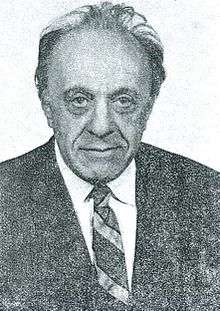Karl Menger
| Karl Menger | |
|---|---|
 | |
| Born |
January 13, 1902 Vienna, Austria-Hungary |
| Died |
October 5, 1985 (aged 83) Highland Park, Illinois, USA |
| Nationality | Austrian |
| Fields | Mathematics |
| Institutions |
Illinois Institute of Technology University of Notre Dame University of Vienna |
| Alma mater | University of Vienna |
| Doctoral advisor | Hans Hahn |
| Doctoral students | Abraham Wald |
| Known for |
Menger sponge Menger's theorem |
Karl Menger (January 13, 1902 – October 5, 1985) was an Austrian-American mathematician. He was the son of the famous economist Carl Menger. He is credited with Menger's theorem. He worked on mathematics of algebras, algebra of geometries, curve and dimension theory, etc. Moreover, he contributed to game theory and social sciences.
Biography
Karl Menger was a student of Hans Hahn and received his PhD from the University of Vienna in 1924. L. E. J. Brouwer invited Menger in 1925 to teach at the University of Amsterdam. In 1927, he returned to Vienna to accept a professorship there. In 1930 and 1931 he was visiting lecturer at Harvard University and The Rice Institute. From 1937 to 1946 he was a professor at the University of Notre Dame. From 1946 to 1971, he was a professor at Illinois Institute of Technology in Chicago. In 1983, IIT awarded Menger a Doctor of Humane Letters and Sciences degree.[1]
Contributions to mathematics
.jpg)
His most famous popular contribution was the Menger sponge (mistakenly known as Sierpinski's sponge), a three-dimensional version of Sierpinski's carpet. It is also related to the Cantor set.
With Arthur Cayley, Menger is considered one of the founders of distance geometry; especially by having formalized definitions to the notions of angle and of curvature in terms of directly measurable physical quantities, namely ratios of distance values.
The characteristic mathematical expressions appearing in those definitions are Cayley–Menger determinants.
He was an active participant of the Vienna Circle which had discussions in the 1920s on social science and philosophy. During that time, he proved an important result on the St. Petersburg paradox with interesting applications to the utility theory in economics. Later he contributed to the development of game theory with Oskar Morgenstern.
Legacy
Menger's longest and last academic post was at the Illinois Institute of Technology, which hosts an annual IIT Karl Menger Lecture and offers the IIT Karl Menger Student Award to an exceptional student for scholarship each year.[2]
Notes
- ↑ "Biography of Karl Menger". Illinois Institute of Technology. Retrieved 2010-12-22.
- ↑ "Remembering Karl Menger". Illinois Institute of Technology. Retrieved 2009-03-26.
Further reading
- Crilly, Tony, 2005, "Paul Urysohn and Karl Menger: papers on dimension theory" in Grattan-Guinness, I., ed., Landmark Writings in Western Mathematics. Elsevier: 844-55.
External links
- O'Connor, John J.; Robertson, Edmund F., "Karl Menger", MacTutor History of Mathematics archive, University of St Andrews.
- Karl Menger at the Mathematics Genealogy Project